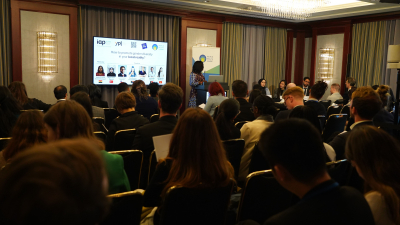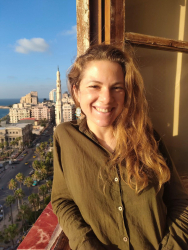


Following their intensive leadership training at the European School of Management and Technology (ESMT) Berlin, the 2024 cohort of the IAP Young Physician Leaders (YPL) Programme took centre stage at the World Health Summit (WHS), held in Berlin on 13-15 October 2024. The WHS, a prestigious global forum for addressing critical health issues, provided the YPL participants with an unparalleled opportunity to showcase their leadership insights while engaging with global health leaders, policymakers and innovators.
This year's WHS brought together some 3,500 international leaders from academia, politics, the private sector and civil society to discuss global health challenges. With a focus on global health security, the UN’s Sustainable Development Goals (SDGs) and the intersection of health with other major global issues like climate change, the annual summit is instrumental in shaping global health policy and practice. For the YPL participants, this year’s WHS was an ideal venue to bring forward their perspectives on health leadership.
On 15 October 2024, the YPL cohort took part in a dedicated session at the WHS titled 'Challenges to Leadership in Healthcare'. This session was the culmination of their leadership journey and a chance to present their ideas on some of the most pressing challenges in global health today. Attended by more than 50 on-site participants and an additional 360 viewers online, the session brought fresh perspectives from the next generation of healthcare leaders. The video recording of the session is available for those who missed it:
The session began with a brief introduction by Peter McGrath, IAP Coordinator, who presented an overview of IAP and the YPL programme, highlighting its role in building a strong network of young leaders in healthcare. Since 2011, the programme has grown into a global initiative with over 280 alumni who continue to impact healthcare systems worldwide.
The first panel of the session addressed a range of geopolitical challenges that impact global health. Participants in this panel included Samiya Abi Jaoude (Lebanon-France), Tiange Wang (China), Seung Won Lee (South Korea), Marton Kolossváry (Hungary), Marina Elichiry (Argentina), Jagath Ranasinghe Opata (Sri Lanka) and Mohd Syafwan Bin Adnan (Malaysia). These young leaders discussed the complex interplay between politics, international relations and health, with a focus on how global conflicts, migration and trade policies shape health systems in their respective countries and worldwide. They highlighted the need for healthcare leaders to navigate these geopolitical realities effectively. One key message was the necessity of cross-border collaboration to strengthen health systems, especially in conflict zones or areas affected by political instability. The panelists emphasized that addressing these challenges requires both technical expertise and diplomacy—skills that they had been developing during the YPL workshop.
The second panel focused on gender equity in healthcare, a critical issue that remains a significant barrier to achieving SDG 3: Good Health and Well-being. Panelists Esther Danquah (Ghana), João Pedro Marques (Portugal), Gordana Georgieva (North Macedonia), Chisale Mabotja Mantwa (South Africa), Thao Thi Phuong Nguyen (Vietnam), Seyma Yusra Soganda (Türkiye) and Luis Antonio Diaz Piga (Chile) explored the pervasive gender inequalities that still exist in health systems in their countries of origin and around the world. Discussions ranged from gender disparities in access to healthcare services to the under-representation of women in leadership roles within health organizations. The panelists called for actionable steps to close these gaps, including gender-sensitive policies, improved mentorship for women in healthcare and structural reforms to make health systems more inclusive. They underscored the fact that achieving gender equity in health not only improves health outcomes for women but for entire communities.
The final panel tackled the challenge of bridging research and policy, with participants Aleksandar Stevanovic (Serbia), Samagra Agarwal (India), Janith Warnasekara (Sri Lanka), Lucinda Leung (USA), Henry Surendra (Indonesia) and Karell Jo Calpito (Philippines) sharing insights on how evidence-based research can better inform policy decisions. This panel emphasized that while there is often a wealth of scientific evidence available to support health policies, the gap between research findings and policy implementation remains significant. The young leaders discussed strategies for closing this gap, such as improving communication between researchers and policymakers, fostering interdisciplinary collaboration and ensuring that research addresses the practical needs of policymakers. They also highlighted the importance of training healthcare professionals in both scientific inquiry and policy advocacy to create a new generation of leaders capable of bridging these two critical fields.

Following the three panel discussions, the session opened up for an interactive Q&A with the audience. Participants fielded questions from health professionals and students attending the summit, allowing for a dynamic exchange of ideas. The conversation touched on topics such as the role of innovation in healthcare, the importance of leadership development for young professionals and the urgent need for global cooperation in facing shared health challenges. The session concluded with wrap-up statements, where the YPL cohort expressed their commitment to applying the skills and insights gained during their leadership training programme to drive positive change in their respective healthcare systems. They emphasized that effective leadership, particularly in the complex field of health, requires not only knowledge but also the courage to challenge the status quo and the vision to create sustainable solutions for the future.
As the 2024 YPL cohort moves forward from their experience at the World Health Summit, they carry with them the lessons and connections forged during the programme. From navigating geopolitical tensions to promoting gender equity and strengthening the research-policy interface, these young leaders are well-equipped to take on the challenges of modern healthcare. Stay tuned for more updates from the 2024 YPL cohort as they continue to engage with global health leaders and drive innovation in their own regions. Their next steps will include applying their leadership skills to real-world challenges, further solidifying the YPL programme’s mission to empower the next generation of health leaders.
Read more about YPL 2024 at ESMT Berlin here.
